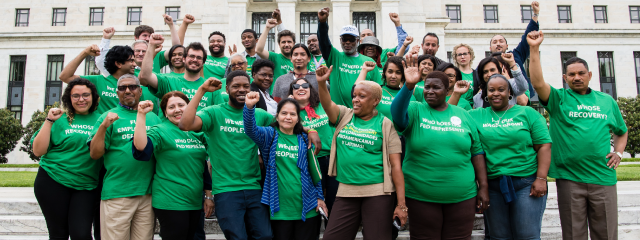Blog
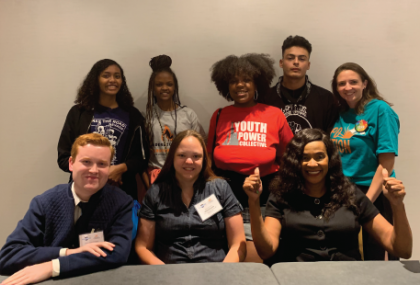
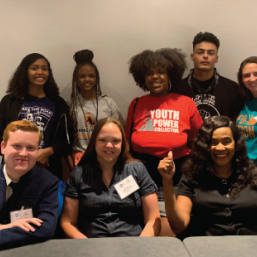
Young people from Latinos Unidos Siempre (LUS), Youth Power Collective/OnePA, Make the Road Nevada (MRNV), and Leaders Igniting Transformation (LIT) led a panel during the Local Progress national convening about the school-to-prison-and-deportation pipelines. During the Local Progress panel, school board members from across the country asked questions regarding students' direct experiences and the policies that contributed to building the school-to-prison pipeline.
The panel members also had the opportunity to share the work that they are leading with their organizations to dismantle the school-to-prison pipeline, which was deeply inspiring to board members. Finally, the panel members offered recommendations for the ways they thought school board members could help change the school-to-prison pipeline in their own schools and communities.
Devene Jimenez, a panel member from Make the Road Nevada, said “the highlight moment, for me, was the questions the school officials had after the panel. You could tell that they were paying attention and had relevant questions after and actually valued what we had to say.” The panel provided youth members with an opportunity to share their expertise and express their opinions.
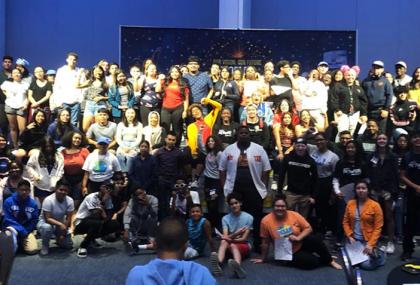
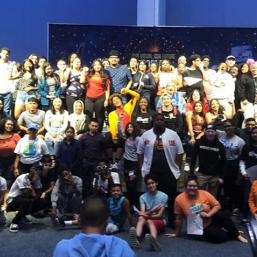
From July 25-27, More than 250 young people from 20 different states representing 26 organizations from across CPD’s network gathered to build community and youth power together at the Center for Popular Democracy’s People’s Convention! The People’s Convention in Detroit brought more than 1,500 grassroots leaders, organizers, elected officials, movement artists and leading national progressive voices YERR members spent together for two days of transformative learning, action and collective power-building. This year, YERR (Youth Everywhere Rising and Resisting), which is a collective of organizations across the CPD/A Network that organize with young people, created a youth track for the convention. More than 250 youth members participated in workshops, open mic performances, marches and more.
Youth from several organizations across the country took on leadership roles and helped make the People’s Convention a success. In the months leading up to the convention, a youth-led planning committee came together to decide on the goals of the youth track at the convention, and then worked to plan and execute activities to realize those goals. The Swag Team created a YERR logo that was printed on buttons and were decorated by the youth as they arrived on Thursday. On Friday, members marched through the streets of Detroit. The 1,500 participants held signs and chanted as they marched. The chant committee held several meetings before the convention to create and discuss chants that would be powerful, and the youth digital team took over CPD/A’s instagram to post updates, do interviews with participants, and help spread information about the march. After the march, there was a rally with youth speakers. The march ended with a fun block party! On Friday night, young people hosted an open mic night during which members shared their talents.
While the People’s Convention was happening, there was also a separate convening of Local Progress, a national network of progressive elected officials. During the convening, young people hosted a panel discussion about the school-to-prison pipeline where youth members shared their experiences of the school-to-prison pipeline and their demands and vision for dismantling it. School Board Members who participated in the workshop appreciated the opportunity to engage with youth from different parts of the country. On Saturday, there was a youth workshop that was centered on the importance of youth power. During this workshop, youth discussed the important history and role of youth activism in creating change. YERR also considered their national Youth Power Platform and started a democratic process to ratify it. Participants also worked to identify people in their network who they could have conversations with to expand the number of people involved in the movement.
The People’s Convention united members of different organizations from all over the country. It allowed youth to connect and feel empowered. Devene Jimenez, from Make the Road Nevada shared that “it was a really beautiful thing to see so many people empowered that came from all over the country and Puerto Rico, and everybody kind of had the same mission. It was really inspiring to see people of all different backgrounds united through one similar goal to make change.”
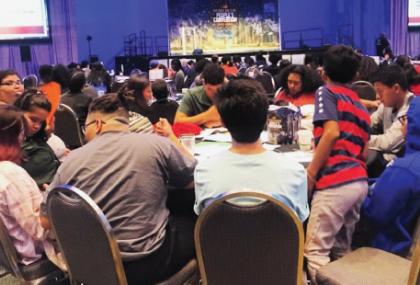

As an end to the People's Convention youth track, the convention launched its very first youth workshop. This event not only gathered around 200 YERR members, but the programming goals were planned by youth! Jeremiah, a member of Make the Road New York, when referring to youth being able to come together in this way stated: “Bringing a bunch of people together for a cause is very powerful, it’s inspiring, it’s a beautiful sight.”
We began by analyzing three different forms of oppression in our communities: capitalism, white supremacy, and patriarchy. We discussed neoliberalism and how we can use people power to reverse the effects of it in our society.
With this grounding on the overarching issues that are detrimental to our communities, we moved into the second half of the workshop where we discussed ways to combat these issues. This kicked off the current year-long process of ratifying the Youth Power Platform which outlines the goals for YERR moving forward. The Youth Power Platform was drafted by a youth committee in the months leading up to the convention and reviewed by YERR leadership before the convening. During the workshop, each of the organizations could vote on whether or not they agreed, disagreed, or had suggestions with each of the tenants in the document.
We ended the day by agreeing that the way to achieve our vision is by building a mass youth movement. Young people practiced their outreach conversation so they could talk with their friends, peers, and community members about joining the movement. Urban Youth Collaborative led this session and included a skit of how to have these conversations. Onyx Walker, a youth leader for the organization described the process of developing the skit and what it was meant to project: “Our process was making it as realistic and relatable as possible while also not making it feel like a set-up.” Youth were able to visualize the massive network they wanted to build with a “Network Tree” activity in which they listed all the people they could reach out to. This activity was created by Make the Road CT. Devene from Make the Road Nevada reflected on this experience: “The part of the youth power workshop with the network tree helped me realize that every single one of us could reach out to our friends and family that we may not have thought had any interest in activism like we do and really make connections.” Each young person committed to reaching out to ten people to grow the movement.
The day ended with celebrator chant and picture!
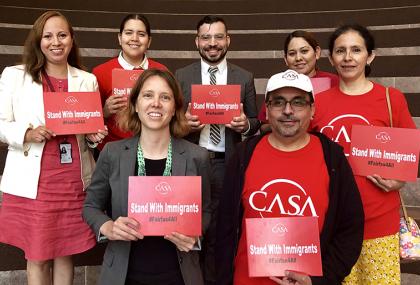
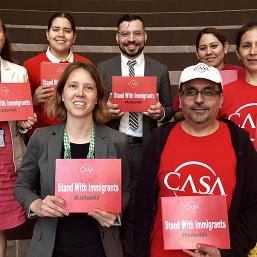
On May 7, Fairfax County made history by becoming the first jurisdiction in Virginia to provide legal representation to immigrants facing deportation proceedings. The Fairfax County Board of Supervisors voted to fund a $200,000 universal representation pilot program, which will benefit immigrants in the county—including lawful permanent residents, DACA recipients, and Temporary Protected Status (TPS) holders—who are currently facing deportation proceedings and who cannot afford an immigration lawyer.
This is critical because unlike in the criminal justice system, immigrants facing deportation have no right to a public defender in immigration court.
“With the passage of universal representation, CASA and our community are proud that Fairfax County has taken a step forward in terms of equity by ensuring that immigrants are treated with dignity by providing legal representation. We will continue advancing immigrant rights as one community,” said Luis Aguilar, CASA Virginia Director.
For years, CPD has supported CASA's work on this issue through policy and legal support, organizing support, and strategic research including "Advancing Universal Representation: A Toolkit" released last year. Representation protects due process by allowing immigrants to access their rights under U.S. law. The decision is invaluable for the more than 175 Fairfax families facing immigration proceedings each year. After this important victory, CASA will focus efforts on ensuring that more jurisdictions in the state of Virginia approve similar programs.
With almost 100,000 members across the states of Maryland, Virginia, and South Central Pennsylvania, CASA is the largest member-based Latino and immigrant organization in the mid-Atlantic region. CASA organizes with and litigates on behalf of low-wage immigrants. Learn more about CASA here.
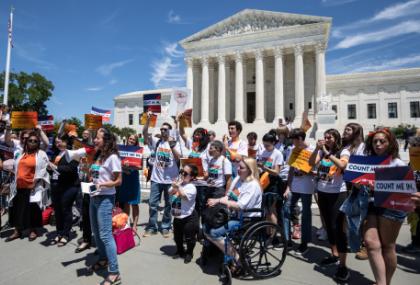
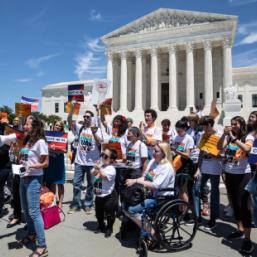
On June 12, the Center for Popular Democracy’s sister organization, CPD Action, brought 200 people to Washington, D.C. for a dramatic series of actions ranging from raising their voices for women’s reproductive health, to challenging the inclusion of the citizen question on the upcoming census, to advocacy for Medicare for All.
The underlying theme was that we are all in this together — a way to strengthen and clarify the shared commitments of our movement.
The day kicked off with a hearing in the The U.S. House Committee on Ways and Means about Medicare for All. The room was packed with activists wearing #MedicareforAll t-shirts. They then marched out for a press conference with Congressmember Pramila Jayapal the lead sponsor on the bill, who makes it clear that we will not leave anyone out of healthcare in this country.
After a quick costume change into t-shirts that said, "United Against Hate," it was off to march on the Supreme Court, where a slate of speakers, including CPD Co-executive Director, Ana Maria Archila, and representatives from CPD affiliates, CASA and Make the Road, spoke about the harm that the Supreme Court would cause were it to rule in favor of keeping the citizenship question on the census.
A smaller group pulled off and delivered a petition to New York Congressmember Jerrold Nadler's office to demand a full investigation into the widely documented lying that Brett Kavanaugh engaged in during his confirmation hearings. Many in the crowd were carrying “Impeach Kavanaugh” signs.
Third costume change of the day: About 150 protestors donned t-shirts that said, “Our Bodies, Our Courts and Our Democracy.” The group took over the atrium of the Hart Senate Office Building and told stories of their abortion experiences. Then they marched to the home of Senator Mitch McConnell to demand the impeachment of Brett Kavanuagh from the Supreme Court. People continued to tell their stories of why access to reproductive healthcare is necessary.
The final costume change of the day moved protestors into activist chic for the CPD Washington, D.C. gala where activists schoolmates of Dr. Christine Blasey Ford and the head of National Nurses United (a major Medicare for All leader) and Congresswomen Ayanna Pressley and Rashida Tlaib, as well as ActBlue’s Erin Hill, were honored.
On July 9th, the CPD Network will be back in Washington, D.C. to call for the impeachment of Brett Kavanaugh. If you are interested in joining us, please reach out to CPD’s National Organizer, Darius Gordon at dgordon@populardemocracy.org.
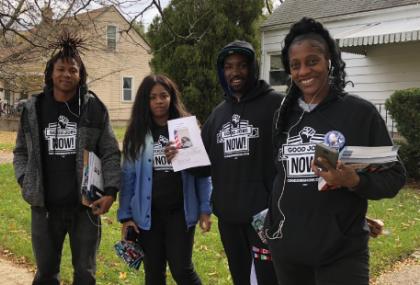
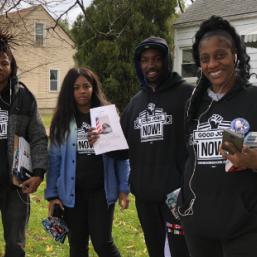
On June 15, Detroit Action, the organization formerly known as Good Jobs Now, held its first Detroit Neighborhoods Summit called “The Future of the Hood.” Detroit Action was joined by over 200 Detroit residents who came together for staff-led workshops on abolition and democracy, on the politics of the hood, and on power building led by youth leaders who make up Voices of Detroit Youth (VODY). The organization’s year-round canvass team pitched folks on why revenue generating membership is a key strategy for building independent politics and a pathway towards liberation.
GJN member and Detroit’s champion Congresswoman, Rashida Tlaib, discussed key bills in Congress to chip away at away at economic precarity in our communities.
The event’s keynote speaker, Maurice Mitchell, National Director of the Working Families Party, grounded participants in the present political, climate, and economic crisis the nation is experiencing, and how people must face it with action—not neutrality—as the only appropriate form of response. To that end, Good Jobs Now is launching itself under a new name, investing both in greater clarity about what’s at stake in Michigan and what’s possible when community members invest in the leadership of those on the frontlines and share a compelling and realistic path forward.
Allow us to reintroduce ourselves... we are Detroit Action, a community of low income, Black and Brown Detroiters who are activated in pursuit of our vision for an inclusive democracy that works for all, one in which we are agents of change and not pawns of misguided electoral strategy.
Now Detroit Action, looks forward to welcoming you to Detroit for CPD’s People’s Convention 2019 this July. They cannot can’t wait for you to meet their team, the brilliant staff of organizers and strategists, and our members whose commitment to building Detroit Action as their movement home deepens every day. And of course, they are so excited for you to get to know Detroit, which is ripe with contradictions and full of Black radical hope: “We’ll see you in the D in July!”
From July 25-27, the People’s Convention will bring together over 1,700 grassroots leaders, organizers, elected officials, movement artists and leading national progressive voices for two days of transformative learning, action and collective power-building. Learn more and register here.
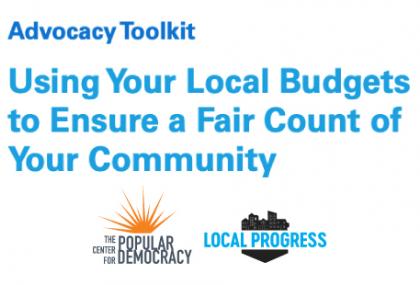
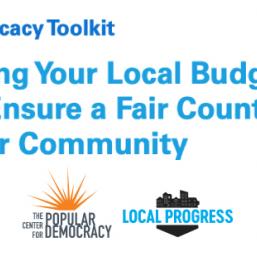
In May, Local Progress and the Center for Popular Democracy released an advocacy toolkit, Using Your Local Budgets to Ensure a Fair Count of Your Community, to help local elected officials leverage their power to support a fair count in the 2020 Census. Getting the 2020 Census count right is critical—it will shape political representation, public policy and funding, private sector investments, and determine whose voice is heard at every level of our democracy.
The census has been chronically underfunded for years. What’s more, the Trump administration is planning to offer insufficient funding in order to ensure an adequate count. The Trump administration is also attempting to add an untested and unnecessary citizenship question to the census. On June 27, the Supreme Court ruled that this attempt violated U.S. law by being “arbitrary and capricious” and prevented it from being added to the census—for now.
Adding a question on citizenship jeopardizes an accurate count because of the almost-certain drop in participation by noncitizens and mixed-immigration-status households. Together, all of this could dampen participation, disenfranchise people in hard-to-count communities, and result in significant ramifications for redistricting and political representation for the next decade.
In this climate, local elected officials have a unique tool: the power to provide budgetary resources to ensure that get out the count (GOTC) to reach hard-to-count populations in their local jurisdictions. To this end, the toolkit offers resources to help electeds calculate funding losses to their jurisdiction that would result from a census undercount. It will also help elected officials determine the amount of resources they should allocate in their budgets to support a complete count. And, it offers advice on how local elected officials can work with their colleagues to exercise leadership in support of GOTC efforts.
Following the release of the toolkit, Local Progress hosted a webinar, featuring Councilmember Erica Spell (Hyattsville, M.D.) and Vice Mayor Sabrina Javellana (Hallandale, Fla.) along with CPD’s Emma Greenman, Director of Voting Rights and Democracy, and Kate Hamaji, Research Analyst, to review the budget advocacy toolkit and highlight the urgent need for local elected officials to take action to ensure a complete and fair count in their jurisdictions.


The Center for Popular Democracy and the National Immigration Law Center published the report "Safe Roads Across the Tri-State Area: The Case for Expanding Access to Driver’s Licenses in New York and New Jersey." As the report highlights, 12 states, plus the District of Columbia and Puerto Rico, have passed laws that make driver’s licenses accessible to all eligible residents, regardless of immigration status. In states where driver’s licenses are available to all residents, clear and compelling evidence demonstrates these policies ensure safer roads, boost state revenues, provide more economic opportunities for working people, and help keep immigrant families together. The report garnered significant press coverage and was featured in the New York Daily News, NY1 Noticias, Univision, and Agencia EFE among outlets.
The report features data on the impact driver's license policies would have in New York and New Jersey, the states where advocates have been tirelessly pushing for these policies. The stories of several members of CPD affiliate Make the Road were highlighted throughout the piece. The report was launched in a press conference on May 29 where CPD Co-executive, Ana Maria Archila, and Senior Research Analyst, Maggie Corser, shared the findings, alongside member leaders from Make the Road New York and Make the Road New Jersey.
On June 17, CPD affiliate Make the Road New York saw a huge victory when New York State passed a comprehensive driver's license policy, granting undocumented immigrants access to drivers license’s after this hard-fought battle.
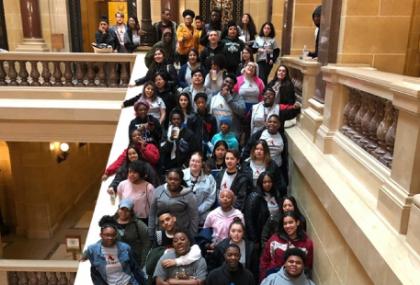
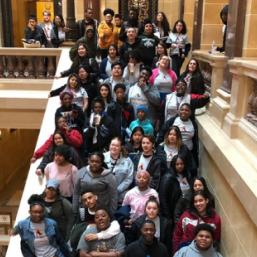
Leaders Igniting Transformation (LIT), a youth-of-color-led organization in Milwaukee, Wisconsin just won a big victory! Since their founding a year and a half ago, LIT has focused on building the leadership of young people in Milwaukee. Their work has pushed Milwaukee Public Schools (MPS) to do better for Black and Brown youth—and they are just getting started. Young people have called on the school district to divest from criminalizing young people and instead invest in supportive and nurturing resources that will give them the freedom to thrive. Check out and share this twitter thread to spread the word!
Recently, they achieved their largest victory yet. The Milwaukee Board of School Directors divested $600,000 from police and security and invested that money into six new mental health positions to focus on trauma-informed care. This is a major victory to start chipping away at the deep criminalization of Black and Brown young people. This marks the first divest/invest win in Milwaukee schools, which came directly from LIT’s advocacy and demands.
This victory came after more than a year and a half of hard work. Last year, a U.S. Department of Education Office of Civil Rights investigation showed that MPS punished students more frequently and more harshly than their white peers. In response, LIT sprang into action. They published a report with CPD that shared their Youth Power Agenda and called for major divestments from policing and punishing young people, instead proposing deep investments in supports and educational resources.
LIT relentlessly pursued that goal. They knocked on 75,000 doors and collected more than 13,000 pledge cards and petitions on their issues. This spring during Milwaukee’s school board elections, LIT engaged young people in the election. Nine out of ten of the school board candidates pledged support for LIT’s Youth Power Agenda.
When the new school board took office, one of their first decisions supported LIT’s demand to divest from policing young people and invest in trauma-informed supports. This is a major win for young people in MPS and a major win for young people across the country who can learn from and build upon this victory.
The work is not over. Though they won a $600,000 divestment, there are still millions of dollars that must be reallocated in order to create thriving public schools for Black and Brown youth. There is still a deeply seeded school-to-prison pipeline in Milwaukee that must be dismantled.
LIT is up for that challenge. Every day, LIT is bringing more and more young people into the movement. In the last year, they’ve started 12 school chapters. They are helping to ensure that the future is Black, Brown and LIT!
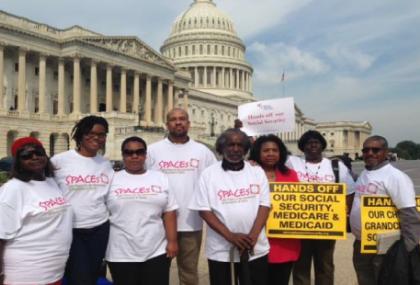
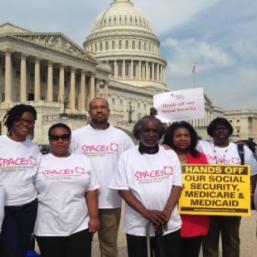
As part of a coordinated effort in Washington, D.C., SPACEs in Action has secured almost $16 million in the city budget for the Birth-to-Three Act for All (B3) passed last year! B3 aims to create infrastructure and support for early childhood learning, providing funding for D.C.’s child care subsidy program, increasing payment for early childhood educators, and supporting pre- and post-natal care and health programs for parents. The budget vote represented a big step forward in making the provisions of the Birth-to-Three for All Act a reality, with the council voting to invest in funding for fiscal year 2020. SPACES and other local organizations met with council members and staff, testified at hearings, placed community leaders' op-eds, called, tweeted, emailed, and came together to strategize around this budget.
The funding comes in part from a $5 million investment from the mayor, but impressively, the rest comes from the efforts of the city council to discover new sources of revenue. Six different councilmembers have provided funding (Councilmembers Vincent C. Gray, Robert C. White, Elissa Silverman, Phil Mendelson, Kenyan R. McDuffie, and Jack Evans), including several whose committees are not closely linked to B3 components. This only stands as a testament to the broad appeal of B3’s goals and to the efficacy of SPACEs in Action’s collective advocacy in partnership with other DC groups.
In tandem with the help of councilmembers, SPACEs in Action would like to note other budgeting changes in the District that will help support B3. The D.C. Fiscal Policy Institute helped identify a revenue source in ineffective tax abatements, and Councilmember Brianne K. Nadeu scaled back ineffective tax credits for tech companies—the first time in recent memory that D.C. has pulled back on such spending. In addition, Councilmember David Grosso introduced a bill to raise property taxes on high-value homes. While this bill is just beginning to go through the legislative process, both of these movements will free up more funding for initiatives and programs like B3, as well as contribute support to housing, mental health, lead repairs, and workforce development.
These preliminary wins are a result of a coordinated effort. SPACEs In Action played a key role within D.C. SPACEs aimed to reach $30 million for B3 legislation, and they look to build on the success they have had thus far. The campaign could not have come this far without the collective hard work of many organizations and community leaders. Learn more about SPACES in Action here.



